I NEEDED A NEW ADVENTURE
NOTE TO SET THE CONTEXT
These are not excuses or complaints, also because in the meantime I finally created Wild Tee, but a premise to better understand the process of recovering from a difficult time.
On 17 November 2015, after more than two years of suffering, I decide to have an operation on my right Achilles tendon. They tell me that in three months I will be able to run again. I really don't know how to organise my training for the season. Shall I sign up or not? That's my mantra. I am not particularly optimistic by nature, but I accept the challenge. A long triathlon in June, a challenging race in August. Having been a sub-21 hour finisher at Western States entitles me to sign up for the Spartathlon and I don't like to leave an opportunity behind even if, when I confirm my registration, I can't run for more than half an hour. After six months, my foot is still swollen, it hurts and I have trouble resting it properly. I try not to think about it and do a lot of cycling and swimming. Doing something different from running is a good strategy, I don't know if I'm doing well or not, I have no reference points. So I try to create them for myself, to gain the confidence needed to face the first test. I have to swim 3.8 km, so I swim 4; I have to pedal 180 km, one day I decide to go to visit my parents in Liguria from Milan and I cover 200 km; I have to run 42 km, I try to limp 44. With this knowledge I end my triathlon. It's time to return to running in the mountains. Running is so wonderful that I don't realise that I run crooked to try to minimize impact on my right foot. My ankle goes into tendon protection and locks up; without realising it, the muscles in my calf and thigh become weaker. What was supposed to be a progressive improvement turns out to be a regression. I realise that it's going to be really tough, I change my plans and manage, however, to find immense joy in a couple of mountain trips that I had missed so much. I arrive at the August race very tired and a little disheartened: in fact, I withdraw before the real difficulties begin. At the time it seemed like the best decision, but as always this comes after some poor reasoning. I bitterly regret it in the days that follow. I could have made it and instead I gave up, how am I going to cover 246 km in a number of hours that I have never run?
THE ULTRAMARATHON
I have never run much on the road, although I live in Milan; the only 100 km I have run was half on trails and with 3000 m of elevation gain.
As always, when I don't know a subject, I look for reference points. Yeah, but for something this big, where do I find them?
I try looking at the times of past editions, but it all seems impossible and unattainable at the moment. On the other hand, the knowledge that the goal is too big for my abilities, as the days go by, gives me peace of mind. When the number of unknowns is too great to be controlled, there is nothing else to do but accept the situation, rely on the #cazzomannaggia method and take things as they come, tackling them one by one. I accept the challenge, set off and see where I can get to.
I will only realise along the way that this is one of the characteristics of the ultramarathon runner.
GREECE
I haven’t been back to Greece for many years. If I remember correctly, the last time I was there, I got off the Brindisi-Patras ferry with my friend Cacio and a half-empty bottle of whisky in my hand, while now I'm going back there to run on foot from Athens to Sparta. I still don't know which of the two is the biggest fuck-up.
The hotel we are staying in is crowded with Eastern and Northern European runners, it is really impressive to see a hotel full of athletes who run many more kilometres per year than the average Italian does by car. One evening at the table, to pass the time, I try to add up the kilometres run by the athletes in the hall, but I quickly lose count. Feeling like a fish out of water, I stand on the sidelines and try to grasp their secrets. Observing them, I realise immediately that there is no secret to discover. The people in front of me are a world selection of humans with the highest degree of humility and determination at the same time.
With this same attitude I take my first step from the Parthenon in Athens towards Sparta.
Used to running in a natural environment, the first kilometres are really at the upper limit of my possibilities. In practice, we run on the ring road, in the emergency lane, in the opposite direction to the rush-hour traffic whizzing into Athens. I try not to think about the lorries that pass us and soon I adapt to the situation and the journey begins. To reach your destination you have to keep going, keep going no matter what happens, maybe slower and slower but never stopping.
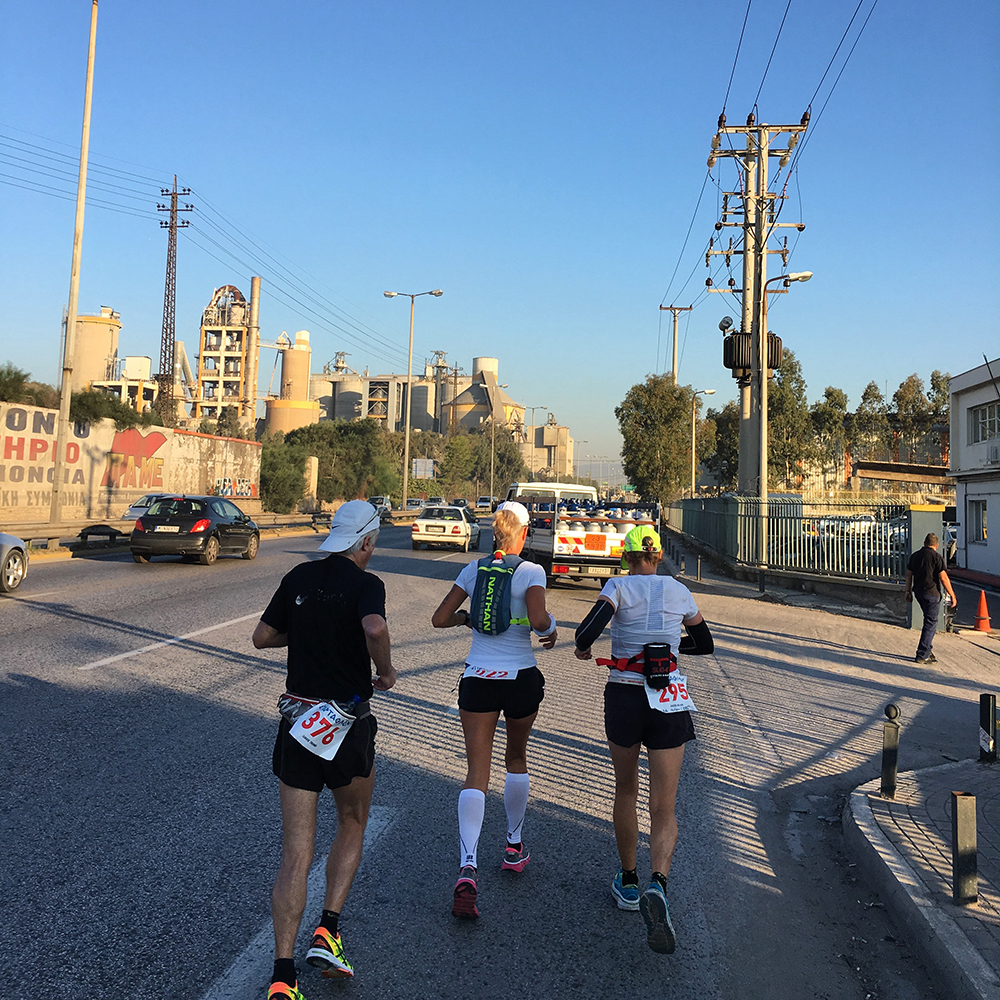
Ah yes, I should write about the race, but it is what happens around the race that fascinates me more and more. The faces and clothing of the runners captivate my attention. Even the clothing of the runners reflects their humility. Perhaps it is because the race is deliberately 'sponsor free' and we have been asked not to display commercial logos, but I see athletes running in worn clothing and shoes, perhaps only for their emotional and motivational value. The technical aspect is totally irrelevant, everyone knows well that it is a race to finish, regardless of what you are wearing or what shoes you run in.
At ten o'clock it starts to get hot. After the first major refreshment stop at Megara, a very beautiful stretch along the coast begins. Few cars, ups and downs with the sea by our side. Already the sea, I begin to imagine the sensation of fresh water as I dive... instead I continue running without being distracted like Ulysses with the Sirens. In fact, we are crossing Greece, the cradle of ancient mythology.
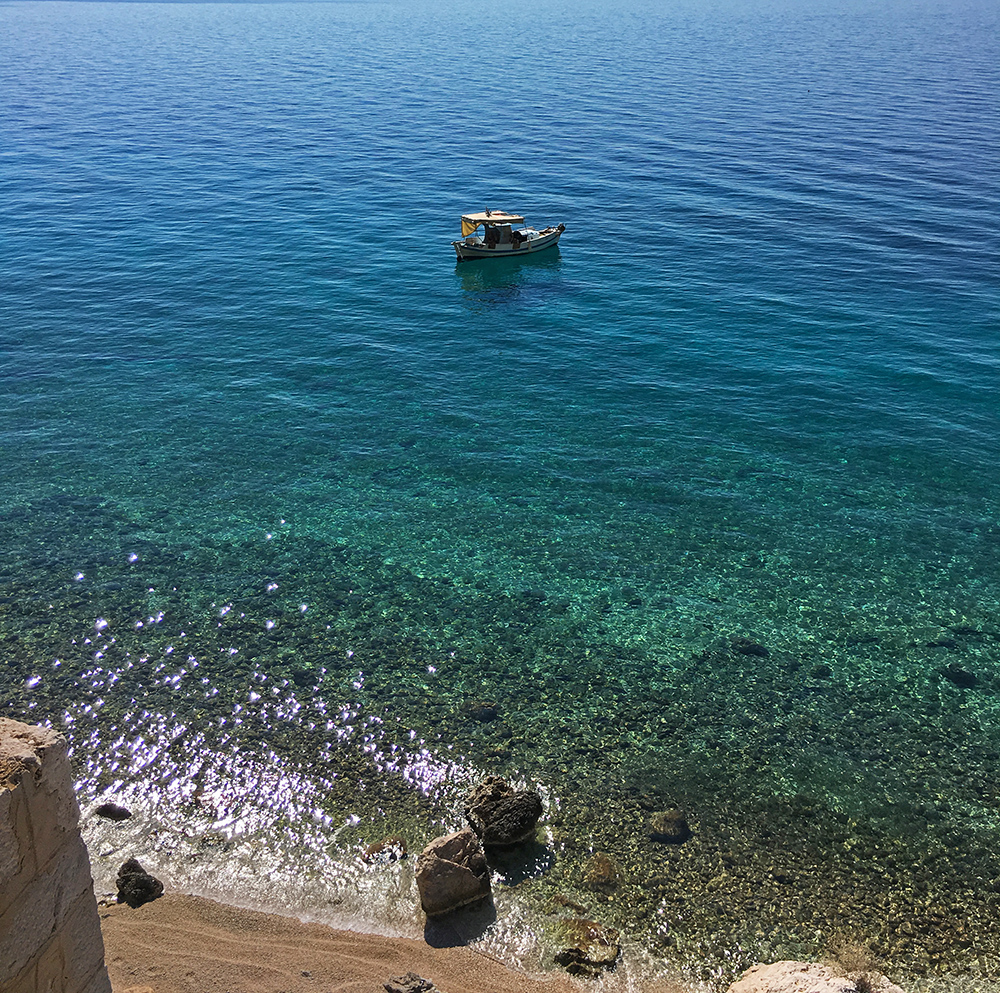
For the first time I try to do some calculations, we have just completed the first marathon... of the six we have to run... no. Better not to perform calculations!
If we had the sea to keep us company before, we are now passing through a refinery that does not seem to care much for its unburnt hydrocarbons. With the air we breathe, one could run a combustion engine. Following this reflection, in relation to how little my body is consuming without polluting, I arrive at the strait of Corinth, which takes me into the Peloponnese.
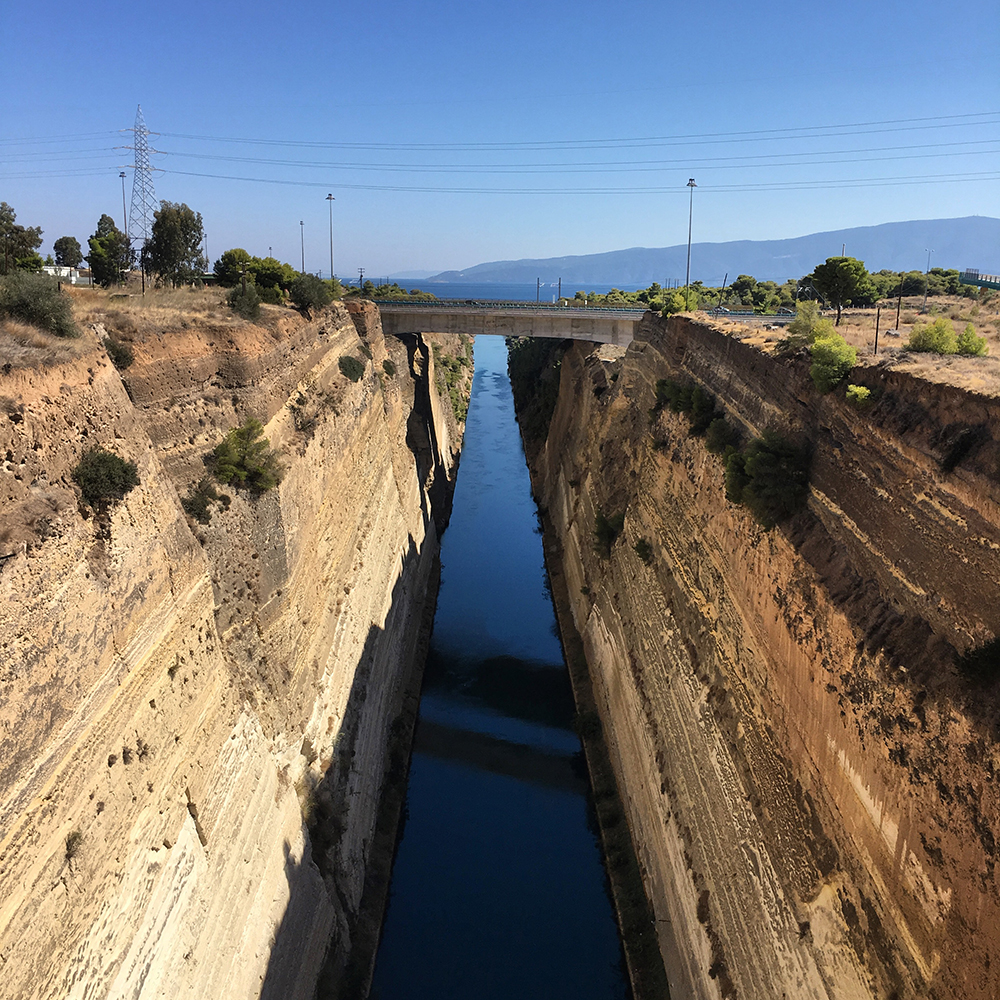
I leave aside the philosophical disquisitions because I have to run quickly to the next checkpoint, with the tightest time barrier of the entire race, and I want to get there a little early to assess the situation with Irene who is following me. So far she’s had plenty of time to organise herself and get ahead of me but from now on the refreshment points where assistance is authorised will be more frequent and I want to share these moments of our journey with her.
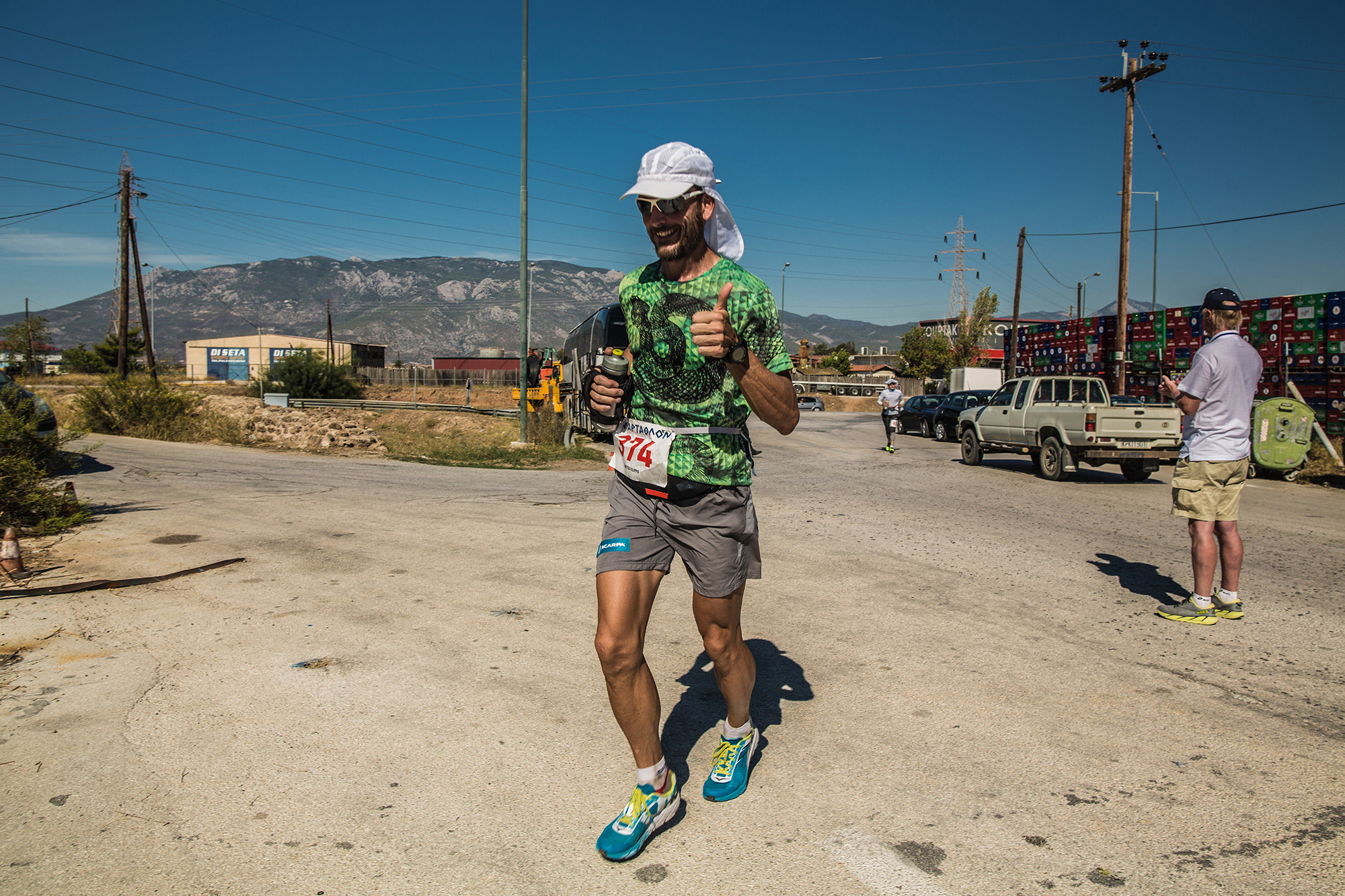
THE HEAT
It is really very hot as we head towards ancient Corinth and I am starting to feel tired. I have passed the most important time barrier but when I think that there are still more than 160 kilometres to go from here to Sparta, my legs give out. I realise that this is not a race but a journey, it is totally irrelevant whether I am overtaken or overtake other competitors. Each of us has now entered his or her own bubble and decided to focus only on him/herself, ignoring everything happening outside. Only now, I realise that I have a badly contracted muscle in my left thigh. I have no interest in finishing times or rankings, so when I see a massage bed being set up I ask if I can have a massage. In the meantime I poke holes in my shirt, I smile knowing that my friend Paco would appreciate the gesture. As proof of his competence, the guy immediately understands that the problem is caused by the fact that I am not supporting my right leg correctly. I thank him, look at the bump on my thigh and set off again. The magic of the long journey continues, any problem that may come my way, I assess it, analyse it with detachment and file it away until the end of the race.
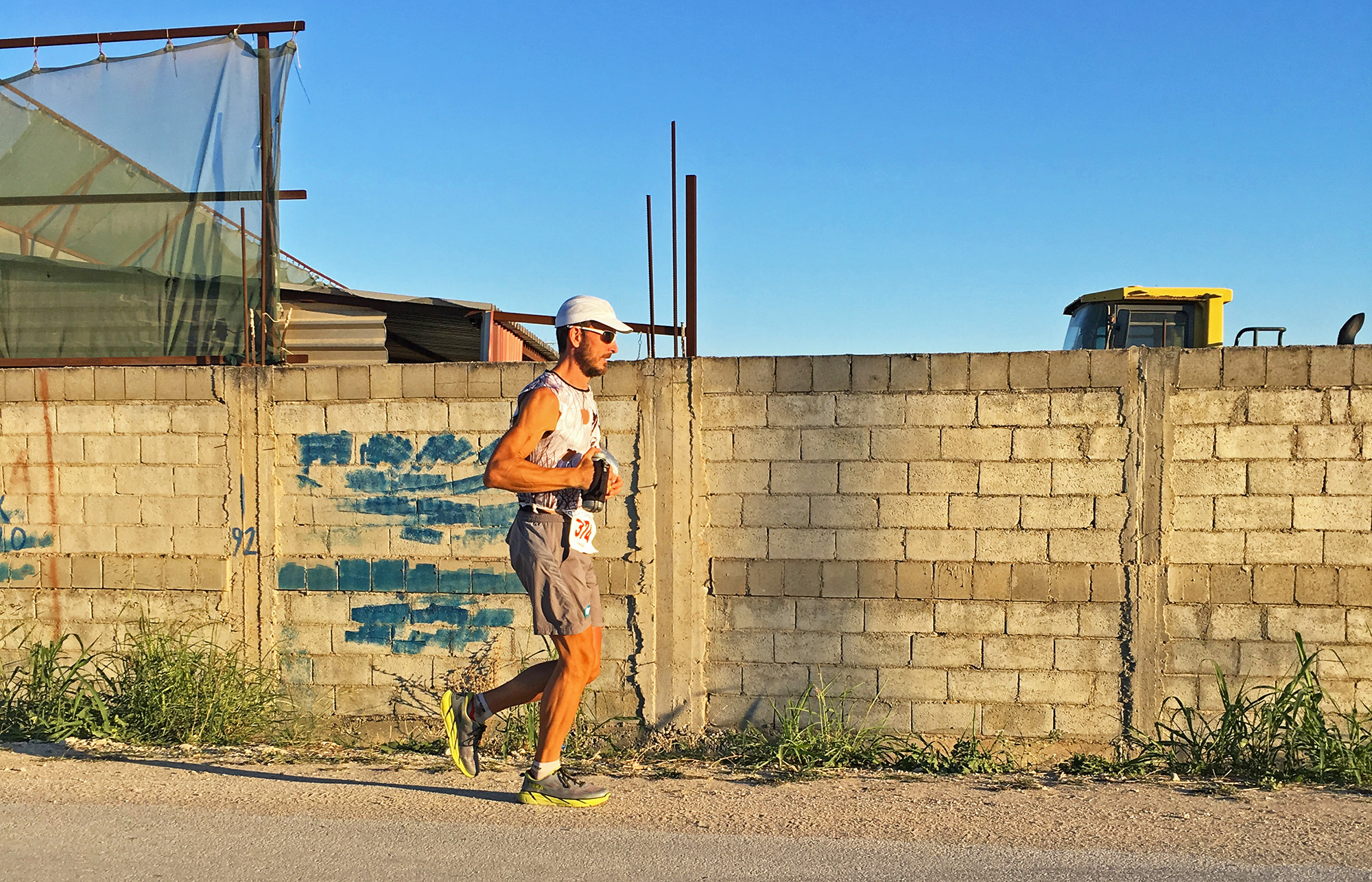
At the main aid stations I sit down and try to eat something. It's a technique I have learnt over the last few years, but it allows me to put something in my upset stomach. I see that this way, when I restart, I always catch up with the same small group of competitors.
We always run in the street. When we cross the small villages, to avoid going up and down the pavements, we literally run in the middle of the road. The men seem less interested, almost annoyed by our passage, while often from the balconies comes a loud cheer from some old lady.
The most beautiful encouragement we receive is from the classes of children waiting in the street for us to pass. I wonder, how many of them will one day try to run from Athens to Sparta?
As is often the case when facing something much bigger than ourselves, our brain is forced to select and deal with only the most important things. Like when you are afraid because you think you are in danger, you think much faster, leaving out all the unnecessary details and only focus on what can get you out of danger. I'm in a bit of a quandary on this stretch: to keep going I concentrate on a few things, like moving forward, drinking, eating something. I leave out everything else and let my body carry me. I don't remember much about this part of the race, the details have faded away from my memory.
Evening approaches, I struggle to eat. I am so deep into the race that instead of worrying about it, as I normally would, I hardly notice it. By nature I am not optimistic, but after 120 kilometres I am immersed in a cosmic fatalism and convince myself that it is only a momentary problem that will pass, sooner or later. Finally, the kilometres to the finish line begin to be fewer than those covered.
THE NIGHT, MAGIC AND CRISIS
We are on a dirt road now, far from the roads and villages when, as if in a trance, I look up and see the starry sky. It is insanely beautiful! A huge shooting star leaves its trail in the sky before splitting into two smaller ones. My wish is very simple: to arrive in Sparta on my own two feet.
The distance to cover is, still, enormous. I am curious to see what will happen when I try to exceed my current limits (170 km and 26 h). It is as if I were a spectator in a film as it reaches its crucial point.
The night begins and I get really sleepy. I've never slept in a race: in fact usually, even the night after a competition, I struggle to doze off. Instead of trying to resist and fight against sleep, I decide to play some of the advantage I have over the time gates by curling up on a wooden bench near a house. As soon as I lie down, I fall asleep with the headlamp still on in my head. I don't know how much time has passed, but I feel better and proceed.
Seeing Irene again is always a joy. I hope she managed to get some sleep too because now our paths will part.
We climb what everyone calls the 'mountain', while the crews in their cars must drive around below. The 'mountain' does not have a name, but for those who have been running on the flat for 150 kilometres, 900 metres of difference in altitude on the trail is a real 'mountain' to climb.
The cool night regenerates me and I recover some of the time lost at the gates. At each check point, a sign indicates the distance covered, the distance to go and the closing time of the refreshment stop. I was hoping to arrive at this point with a bigger gap. I try to catch up but I start to get cold despite the sky being overcast. I didn't expect to throw up in the cold, I was prepared for it to happen during the day in the heat. I don't get scared, it's something that happens to me a lot, unfortunately my stomach has always been my weak point. I still haven't managed to figure out why, but at some point it stops cooperating. I proceed by trying to drink and eat as little as possible. I have no other option but to slow down.
Often in races, especially lately, in situations like this I think ‘why am I doing this?', but during this journey, driven by curiosity to see what happens next I proceed, very calmly, whatever happens.
More and more I convince myself that the best qualities of an ultramarathon runner are determination and patience.
My advantage over the gates gets narrower, I try to maintain a cruising speed as constant as possible. Soon the sun will rise and it will be a new day.
Dawn catches up with us on a foggy plain, foggy like our thoughts. The second day of the race begins. I am now in a different dimension where I see myself running from the outside, as if I were another person over whom I still exert some influence.
THE TURNING POINT
I don't know exactly by what calculation, but when I reach the one hundred and seventy-first (it's hard to even write it) kilometer, in the grips of a strange euphoria, I tap on the window of the car where Irene is sleeping and tell her that we are going to Sparta.
My stomach has not yet recovered, the refreshments do not offer much, but against all logic I decide to play the Greek card. It is said, in fact, that the best Greek runners eat yoghurt and honey. This takes a while to go down but it settles my stomach. I start drinking and eating again. So, sixty kilometres from Sparta, when I imagined I would no longer make it, I start running again.
The sun begins to scorch once more, as relentless as yesterday.
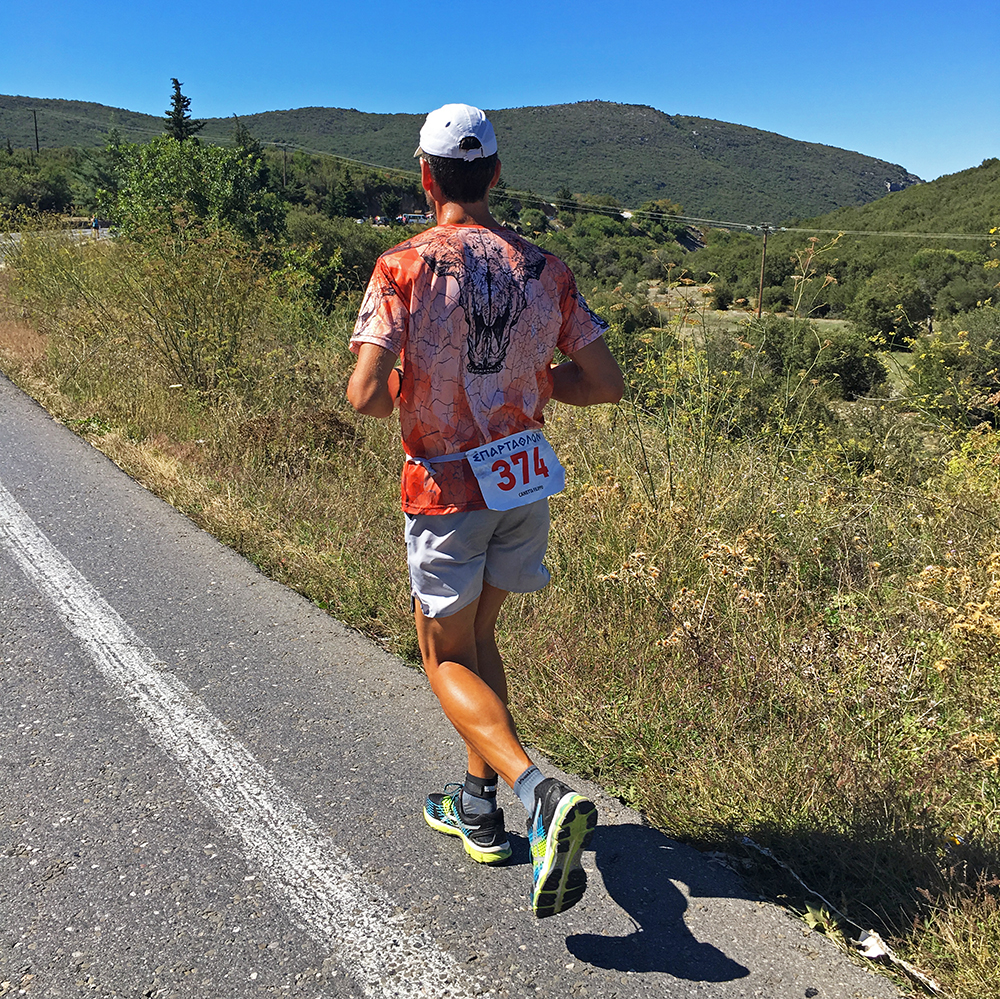
I make time on the time barriers, begin to overtake the other runners and reduce my stops just to fill my handheld water bottle and my ice hat. Two tricks I learned at Western States. At first my head hurts, like when you eat an ice cream too fast, and then, gradually, the feeling of well-being helps you not to waste energy on cooling the most important organ in your body.
Now my body has adapted to the situation, at this speed I find that it consumes even less than I thought.
While passing through a village, some children are on the street with a notebook in their hands. At first I don't quite understand, they are there waiting for us to ask for an autograph or a few words on paper. At this point, our souls are bare, without protection, and emotions are gushing out. I stop and with a trembling hand try to write my name and bib number on the paper in the hand of a girl my daughter's age. I can't hold back the tears and what I write gets wet, I am infinitely sorry but I don't know how to wipe it away. Over the next two hours, as I think back on this episode, I get goosebumps despite the thirty-five degrees. It is a bit like when you are winning a race, while you are running if you think about it you get excited and fatigue disappears and for a moment you run stronger.
On the final descent the heat increases more and more, my legs hurt like crazy, but I try to run, I want to finish.
When you have covered two hundred and thirty-six kilometres you think that you have made it and, at the same time, that anything can still happen.
I am amazed that despite everything I am still coherent to fully experience all the emotions I am feeling.
To be able to run even after two hundred and forty kilometres is wonderful. I always wondered if I could do it.
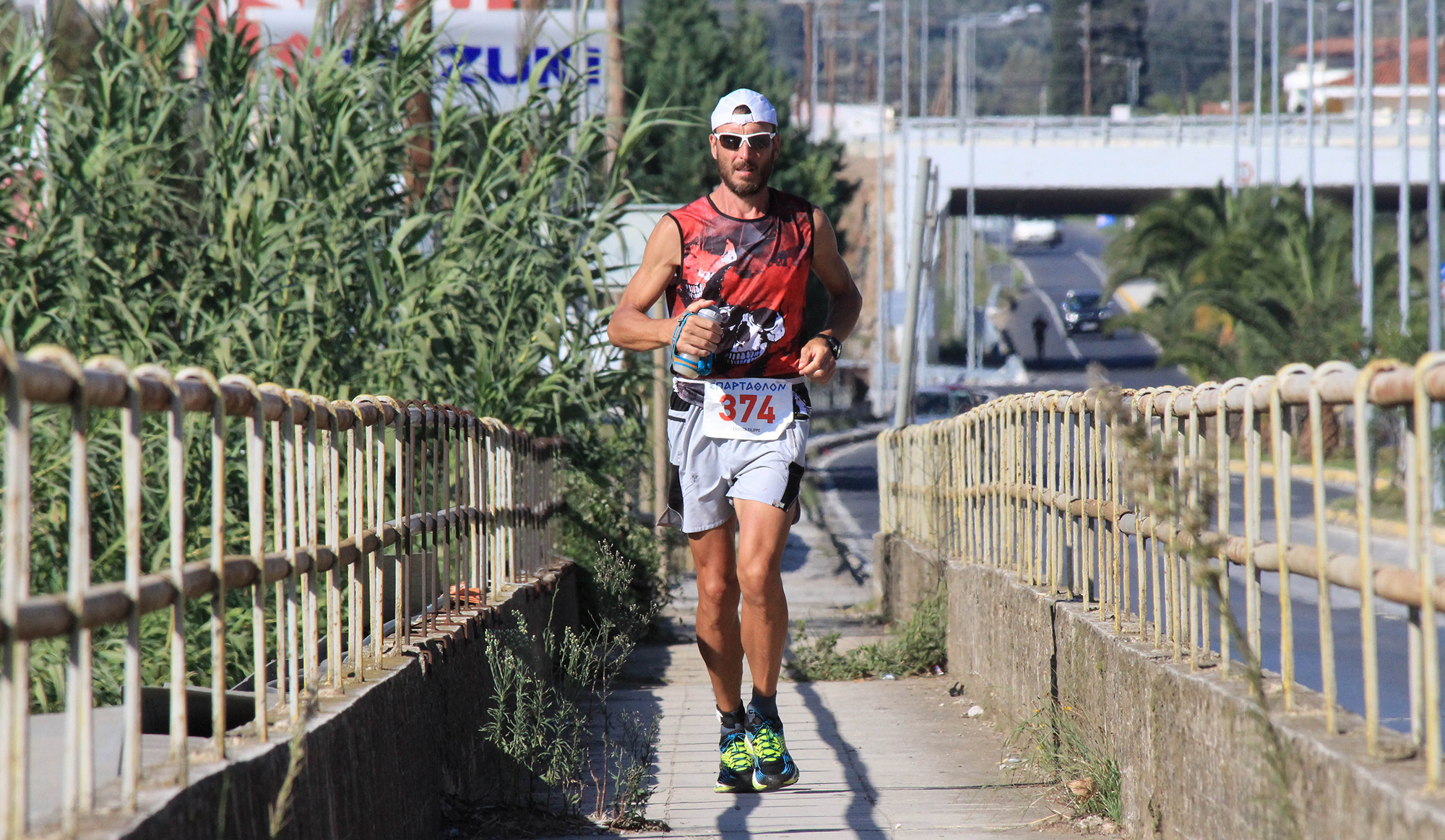
The last kilometres are a party, everyone greets us and we runners congratulate each other as we run through the streets of Sparta.
The last two hundred metres are the ones that change a runner's life, a bit like the arrival at the Place de l'Eglise in Chamonix for a trail runner. Children run alongside me in the final straight to the statue of King Leonidas.
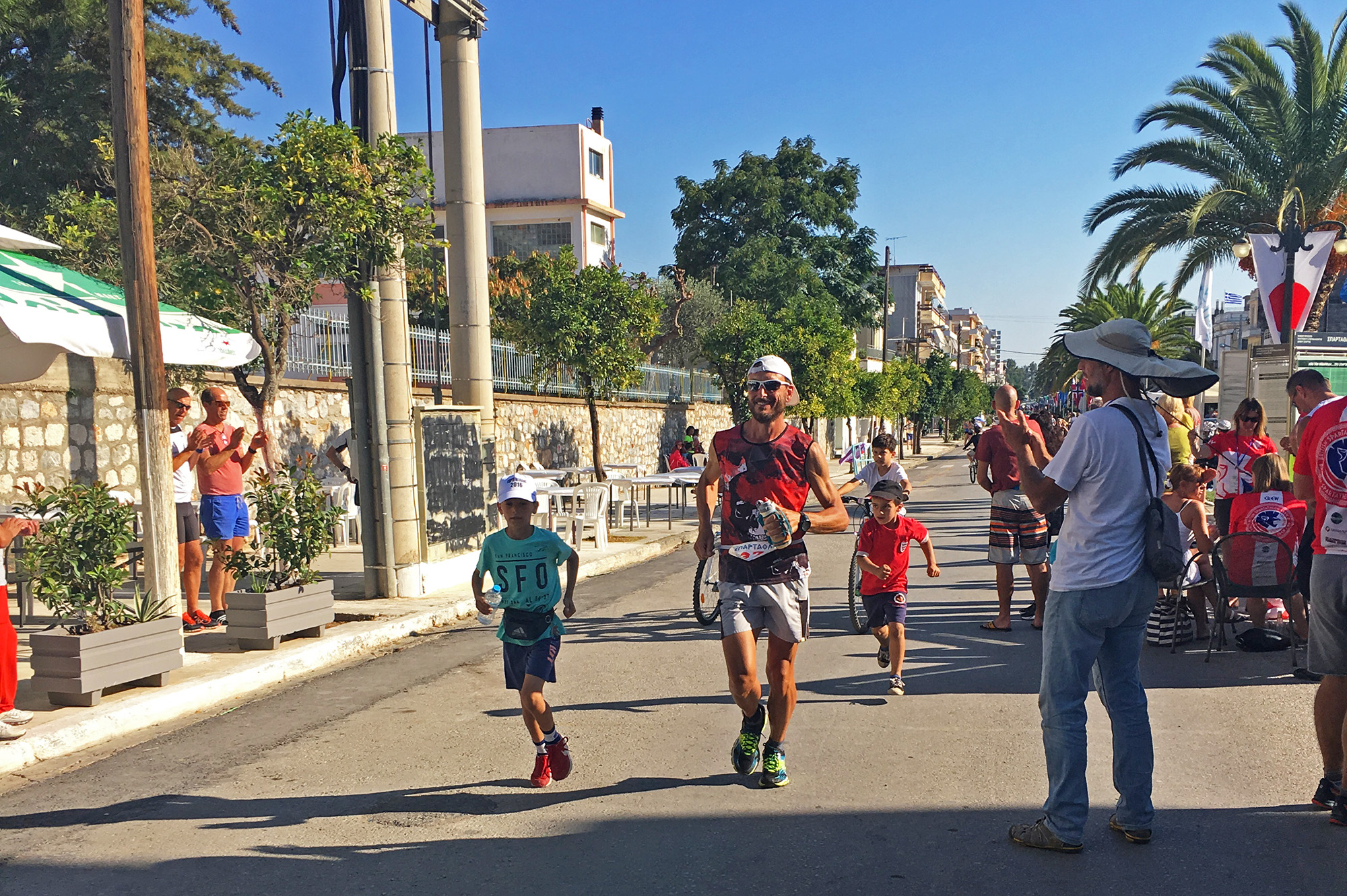
Doing something different, unknown, with a thousand unknowns renews the spirit of adventure that drives us to do things greater than ourselves.
P.S.: The Wild Tee T-shirts passed the test with flying colours!



